Mutant Ecologies traces the spinning of new synthetic threads into the web of life. It is a critical cartography of the shifting landscapes of capital accumulation conjured by recent developments in genomic science, genome editing and the biotech industry.
CRISPR crops, fast-growing salmons, heat-resistant Slick™ cows, Friendly™ Mosquitoes, humanised mice, pigs growing human organs – these are but a few of the dazzling new life-forms that have recently emerged from corporate and university laboratories around the world, all promising to lubricate the circuits of capital accumulation in distinct ways. The deliberate induction of genetic mutations is increasingly central to business operations in a number of sectors, from agriculture to pharmaceuticals.
While the Nobel Committee recently proclaimed the life sciences to have entered ‘a new epoch’, the authors show how these technological innovations continue to operate within a socio-historical context defined by the iron rules of capitalist competition and exploitation. Capital no longer contents itself with simply appropriating the living bodies of plants and animals. It purposefully designs their internal metabolism, and in that way it redesigns the countless living vectors that constitute the global biosphere. It is driving a biological revolution, which will ripple through the everyday lives of people everywhere.
Tabella dei contenuti
Introduction
1. Life’s Inner Workings
2. Manufacturing Lives
3. Genomic Infrastructures
4. Crispr Assembly Lines
5. Molecular Factory Farms
6. Engineering Extinction Ecologies
7. Pharmaceutical Lives
8. Bioengineering the Human
Conclusion
Circa l’autore
Amedeo Policante is a Researcher at the Nova University of Lisbon. His writings interrogate the nexus of extraction, exploitation and expropriation that fuels the contemporary world market. He is the author of two books: The Pirate Myth and The New Mercenaries.












